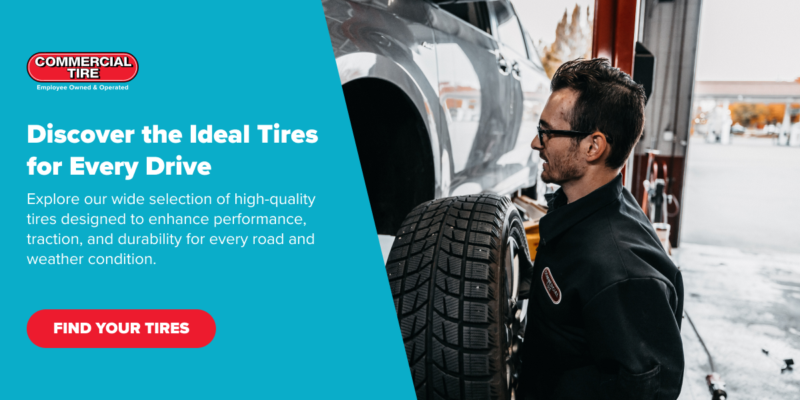If you’ve ever stared at a wall of tires wondering, “What type of tires does my car need?”—you’re not alone. It’s a common question with a not-so-straightforward answer. Because while all tires may look round and black, not all are built the same. From terrain to tread to temperature to tire wear patterns, there are dozens of variables at play—and choosing wrong can cost you in performance, safety, and fuel efficiency.
But don’t stress. At Commercial Tire, we’ve been helping Northwest drivers make the right tire decisions for over 50 years. Whether you’re commuting through Boise, hauling in Nampa, or braving mountain passes near Spokane, we’ve got the know-how (and the neighborly service) to get you rolling safely.
Let’s break down how to choose tires for your vehicle—without the guesswork or the jargon.
Understanding the Right Tires for Your Car
Tires are the unsung heroes of your vehicle, pivotal for both traction and performance. They grip the road, absorb shocks, and test conditions during speed and braking to keep you safe at 70 miles per hour. But if you’ve never considered tire size, sidewall letters, or types of terrain, that’s okay. That’s where we come in.
Selecting the right new tires depends on your vehicle, driving habits, and conditions. There are many different types of tires. It’s not just about what fits—it’s about what performs best under your conditions. Here are some aspects to consider when selecting tires. The best tires for your car might not be the same as your neighbor’s, due to different driving needs and conditions.
Factors to Consider When Choosing Tires
Still asking, how to choose tires for my vehicle? Here are the biggest things to keep in mind:
Vehicle Type and Model
The number of tire options is vast, so understanding your vehicle’s requirements provides essential guidance. Start with the basics—what kind of car are you driving? A compact sedan, full-size pickup, or family SUV? Every make and model has a recommended tire size and load rating, which you can usually find in your owner’s manual or inside the driver-side door frame. These vehicle tire specifications ensure proper handling, braking, and stability.
Bonus tip: If you’re driving a high-powered car and love that zip around corners, high performance tires may be your best fit with their superior speed rating. But if you’ve got a work truck that requires off-road toughness, off-road tires will give you the traction and durability you need.
Understanding Tire Size and Specifications
Tire shopping gets tricky fast if you’re not sure what the numbers on the sidewall mean. That’s where a tire size guide comes or a tire calculator becomes helpful. For example, something like “P215/65R16” breaks down into width, aspect ratio, construction, and wheel diameter.
Understanding how to read your tire size can save you from a costly mistake. A mismatch in size or load rating can mess with your fuel economy, wear patterns, and even your suspension.
And don’t forget about tire pressure for vehicles. Even the best tire underperforms if it’s underinflated. Maintaining proper pressure helps extend tread life, improves gas mileage, and keeps your ride safe.
Seasonal Conditions and Weather
Here in the Northwest, weather can swing from sun-soaked to snow-packed in a flash. That means your tires need to match your conditions. Your car’s tires should suit the climate and road conditions, providing the necessary traction, performance and tire alignment. Ask yourself:
- Do I drive on snowy or icy roads regularly?
- Do I deal with heavy rain or off-road terrain?
- Do I want a tire that performs year-round?
If you’re torn between all-season vs. winter tires, know this: winter tires are built with special compounds and tread for freezing temps and icy traction. All-season tires offer versatility, but they’re not miracle workers in extreme cold.
Driving Habits and Terrain
The daily grind matters more than you’d think. If you stick to highways and city roads, highway tires or all-season tires might be all you need. But if you’re heading off the beaten path or hauling loads through muddy fields, mud terrain tires or all-terrain tires are your best bet.
We often get customers asking, what’s the difference between mud tires and all-terrain tires? In short: all-terrain tires are more versatile and better for mixed use, while mud tires are aggressive and built for deep, slippery surfaces. Each has its pros depending on how—and where—you drive.
Pro tip: If you want the best tires for fuel efficiency, steer toward options with lower rolling resistance and tread designed for smooth pavement. Your wallet will thank you at the pump.
Different Types of Tires for Your Vehicle
Now that you’ve nailed the basics, let’s look at the most common types of tires we carry at Commercial Tire—and how they stack up based on your driving needs.
Winter/Snow Tires
When dealing with snowy roads, icy hills, or freezing temps, winter/snow tires are essential. With deep tread patterns and cold-resistant rubber compounds, these winter/snow tires provide the grip and control you need in tough winter conditions. They’re the gold standard for tire safety tips for winter driving.
All-Terrain Tires
Perfect for the weekend warrior or the daily hauler, all-terrain tires are rugged enough for backroads but tame enough for highway driving. If you’re switching between dirt, gravel, and asphalt, this is your go-to.
All-Season Tires
All-season tires also accommodate different driving conditions. As the name suggests, all-season tires work year-round in moderate climates. They balance performance, comfort, and durability—and they’re often the default choice for new cars. These are great for light snow but may underperform in extreme winter conditions. Compare these to winter tires for heavier snow.
All-Weather Tires
Need a tire that can truly do it all? All-weather tires offer better winter handling than all-seasons and can be driven year-round. They’re a great fit for drivers who don’t want to switch tires seasonally but still face snow and slush.
Highway Tires
Built for smooth, long-distance driving, highway tires offer comfort, quiet, and long tread life. These are ideal for commuters, families, or delivery drivers spending most of their time on pavement.
Mud Terrain Tires
Need something serious for the mud, gravel, or backcountry? Mud terrain tires feature aggressive tread patterns that dig deep into loose terrain. They’re not the quietest on the highway, but they’re unbeatable when the going gets messy.
Make the Right Choice for Your Car’s Tires with Commercial Tire
So—what type of new tires your car needs or how often to replace tires depends on your vehicle, your lifestyle, and where the road (or trail) takes you. Information about your driving habits will guide you in choosing the right fit. At Commercial Tire, we don’t just sell tires—we help you choose the best tires for your car with safety, performance, and convenience in mind.
From car tire maintenance tips to understanding how tire age affects performance, our team is here to help you make confident decisions, whether you’re buying tires online or visiting one of our locations across the Northwest.
We proudly carry trusted brands like Bridgestone, Firestone, and Cooper, and we back every install with our commitment to quality service and community care. Stop by, give us a call, or schedule your appointment online. We’ll help you hit the road with peace of mind—and the perfect set of tires.
Sources:

